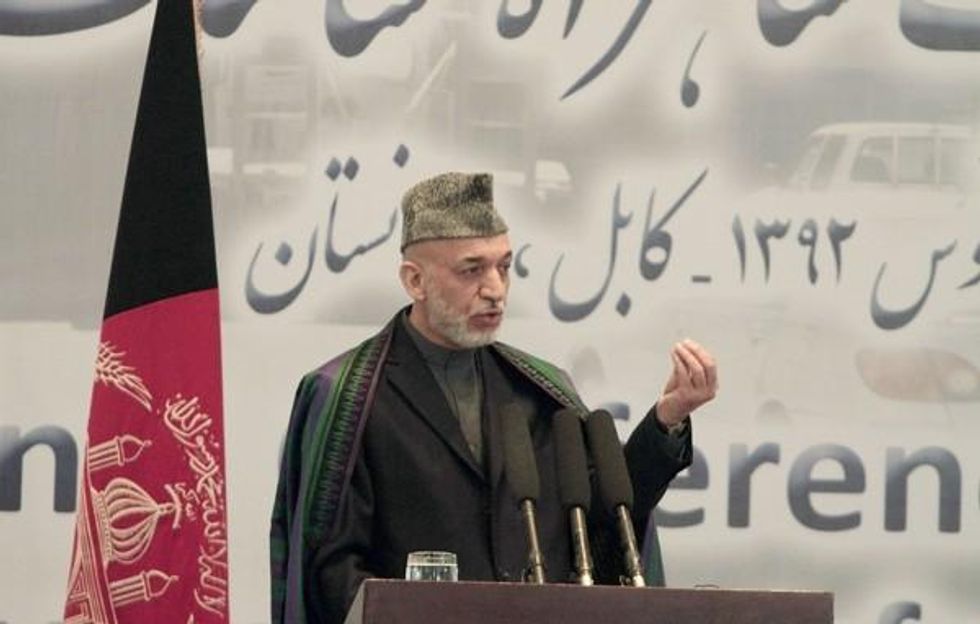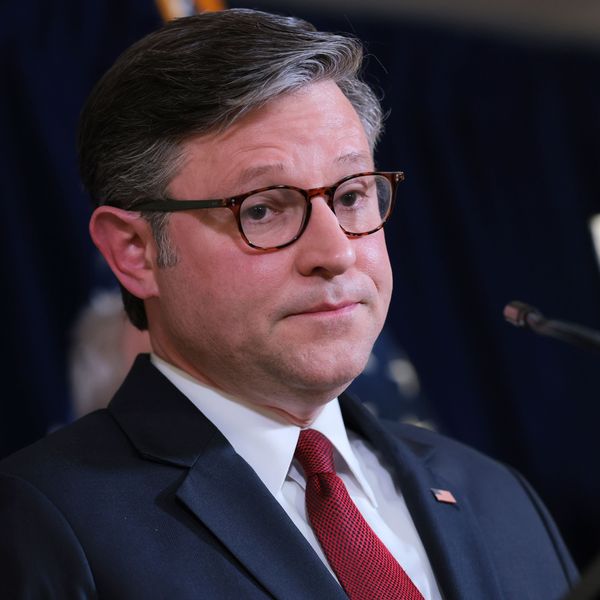Why Can't Karzai Be More Blase About US Killing Kids-Like US Press Is?
Over last weekend, reports emerged about a US coalition airstrike in Afghanistan that killed a two-year-old boy.

Right in the lead, the boy's death was called "the latest crisis to confront American officials" who are trying to finalize a security deal with the Afghan government. The Post's Tim Craig went on to say that the "civilian casualties could not have come at a worse time for US diplomats," and that the "death of the child further complicates the already strained relationship" between the US and Afghan governments.
Yes, poorly timed kid-killing really complicates things.
Much of the journalism about Afghanistan right now is about the "strain" between Afghan President Hamid Karzai and the United States, expressing bafflement and irritation at Karzai's criticism of US military attacks that kill civilians. The New York Times got into the act on December 1, when reporter Rod Nordland wrote a piece on this topic.
Under the headline "Afghans Assail Karzai's Disparate Views on Killings," Nordland explained that Karzai was getting outraged by US attacks on civilians, but staying mum when the attackers are the Taliban: "The attack he complained about was carried out by the American-led coalition and used a drone. The attack he ignored was by the Taliban and used a suicide bomber."
Nordland explains that the "disparity in the Afghan president's reaction has been rued by American officials here"-no surprise there-but that it also "has started to draw criticism among many Afghans." Given that this is the message of the headline, you have to assume it's the most important point of the article. Nordland writes:
In short, many Afghans have begun asking, Who exactly are our enemies here? The Americans, who underwrite our government and military but now say they will be forced to withdraw in 2015 without a security deal? Or the Taliban, who have a history of killing officials even remotely connected with the government-a policy that has apparently begun to claim the lives even of some independent relief workers?
That's a New York Times reporter's criticism of Karzai; which Afghans are saying this? That's hard to say, because Nordland quotes just one person saying this: Atiqullah Baryalai, who used to work for Karzai. There are plenty of other Afghans in the piece, but they're mostly concerned with the debate over signing the security arrangement with the United States.
It's not unheard of for journalists to express strong opinions about how the United States should conduct its wars. ABC Pentagon correspondent Martha Raddatz (FAIR Blog, 6/6/11) once declared this about the US war in Afghanistan: "The airstrikes and these night raids just simply have to continue if they're going to go after the enemy." That's the kind of opinion you're allowed to express.
But sometimes reporters express their opinions by attributing them to others-New York Times reporter John Burns (Extra!, 11/08) did this when he would say things like, "In my experience, the great majority of Iraqis are...very loathe to see those American troops leave now." Actually, surveys showed most Iraqis wanted US troops to leave their country.
It's not clear what Afghans think about how long US troops should stay. But it seems clear that it's more the case that a New York Times reporter-and not "many Afghans"-are mad at Karzai for being mad at US attacks on civilians. The headline "US Government, Reporters Assail Karzai's Disparate Views on Killings" would have been more accurate.
An Urgent Message From Our Co-Founder
Dear Common Dreams reader, The U.S. is on a fast track to authoritarianism like nothing I've ever seen. Meanwhile, corporate news outlets are utterly capitulating to Trump, twisting their coverage to avoid drawing his ire while lining up to stuff cash in his pockets. That's why I believe that Common Dreams is doing the best and most consequential reporting that we've ever done. Our small but mighty team is a progressive reporting powerhouse, covering the news every day that the corporate media never will. Our mission has always been simple: To inform. To inspire. And to ignite change for the common good. Now here's the key piece that I want all our readers to understand: None of this would be possible without your financial support. That's not just some fundraising cliche. It's the absolute and literal truth. We don't accept corporate advertising and never will. We don't have a paywall because we don't think people should be blocked from critical news based on their ability to pay. Everything we do is funded by the donations of readers like you. Will you donate now to help power the nonprofit, independent reporting of Common Dreams? Thank you for being a vital member of our community. Together, we can keep independent journalism alive when it’s needed most. - Craig Brown, Co-founder |

Right in the lead, the boy's death was called "the latest crisis to confront American officials" who are trying to finalize a security deal with the Afghan government. The Post's Tim Craig went on to say that the "civilian casualties could not have come at a worse time for US diplomats," and that the "death of the child further complicates the already strained relationship" between the US and Afghan governments.
Yes, poorly timed kid-killing really complicates things.
Much of the journalism about Afghanistan right now is about the "strain" between Afghan President Hamid Karzai and the United States, expressing bafflement and irritation at Karzai's criticism of US military attacks that kill civilians. The New York Times got into the act on December 1, when reporter Rod Nordland wrote a piece on this topic.
Under the headline "Afghans Assail Karzai's Disparate Views on Killings," Nordland explained that Karzai was getting outraged by US attacks on civilians, but staying mum when the attackers are the Taliban: "The attack he complained about was carried out by the American-led coalition and used a drone. The attack he ignored was by the Taliban and used a suicide bomber."
Nordland explains that the "disparity in the Afghan president's reaction has been rued by American officials here"-no surprise there-but that it also "has started to draw criticism among many Afghans." Given that this is the message of the headline, you have to assume it's the most important point of the article. Nordland writes:
In short, many Afghans have begun asking, Who exactly are our enemies here? The Americans, who underwrite our government and military but now say they will be forced to withdraw in 2015 without a security deal? Or the Taliban, who have a history of killing officials even remotely connected with the government-a policy that has apparently begun to claim the lives even of some independent relief workers?
That's a New York Times reporter's criticism of Karzai; which Afghans are saying this? That's hard to say, because Nordland quotes just one person saying this: Atiqullah Baryalai, who used to work for Karzai. There are plenty of other Afghans in the piece, but they're mostly concerned with the debate over signing the security arrangement with the United States.
It's not unheard of for journalists to express strong opinions about how the United States should conduct its wars. ABC Pentagon correspondent Martha Raddatz (FAIR Blog, 6/6/11) once declared this about the US war in Afghanistan: "The airstrikes and these night raids just simply have to continue if they're going to go after the enemy." That's the kind of opinion you're allowed to express.
But sometimes reporters express their opinions by attributing them to others-New York Times reporter John Burns (Extra!, 11/08) did this when he would say things like, "In my experience, the great majority of Iraqis are...very loathe to see those American troops leave now." Actually, surveys showed most Iraqis wanted US troops to leave their country.
It's not clear what Afghans think about how long US troops should stay. But it seems clear that it's more the case that a New York Times reporter-and not "many Afghans"-are mad at Karzai for being mad at US attacks on civilians. The headline "US Government, Reporters Assail Karzai's Disparate Views on Killings" would have been more accurate.

Right in the lead, the boy's death was called "the latest crisis to confront American officials" who are trying to finalize a security deal with the Afghan government. The Post's Tim Craig went on to say that the "civilian casualties could not have come at a worse time for US diplomats," and that the "death of the child further complicates the already strained relationship" between the US and Afghan governments.
Yes, poorly timed kid-killing really complicates things.
Much of the journalism about Afghanistan right now is about the "strain" between Afghan President Hamid Karzai and the United States, expressing bafflement and irritation at Karzai's criticism of US military attacks that kill civilians. The New York Times got into the act on December 1, when reporter Rod Nordland wrote a piece on this topic.
Under the headline "Afghans Assail Karzai's Disparate Views on Killings," Nordland explained that Karzai was getting outraged by US attacks on civilians, but staying mum when the attackers are the Taliban: "The attack he complained about was carried out by the American-led coalition and used a drone. The attack he ignored was by the Taliban and used a suicide bomber."
Nordland explains that the "disparity in the Afghan president's reaction has been rued by American officials here"-no surprise there-but that it also "has started to draw criticism among many Afghans." Given that this is the message of the headline, you have to assume it's the most important point of the article. Nordland writes:
In short, many Afghans have begun asking, Who exactly are our enemies here? The Americans, who underwrite our government and military but now say they will be forced to withdraw in 2015 without a security deal? Or the Taliban, who have a history of killing officials even remotely connected with the government-a policy that has apparently begun to claim the lives even of some independent relief workers?
That's a New York Times reporter's criticism of Karzai; which Afghans are saying this? That's hard to say, because Nordland quotes just one person saying this: Atiqullah Baryalai, who used to work for Karzai. There are plenty of other Afghans in the piece, but they're mostly concerned with the debate over signing the security arrangement with the United States.
It's not unheard of for journalists to express strong opinions about how the United States should conduct its wars. ABC Pentagon correspondent Martha Raddatz (FAIR Blog, 6/6/11) once declared this about the US war in Afghanistan: "The airstrikes and these night raids just simply have to continue if they're going to go after the enemy." That's the kind of opinion you're allowed to express.
But sometimes reporters express their opinions by attributing them to others-New York Times reporter John Burns (Extra!, 11/08) did this when he would say things like, "In my experience, the great majority of Iraqis are...very loathe to see those American troops leave now." Actually, surveys showed most Iraqis wanted US troops to leave their country.
It's not clear what Afghans think about how long US troops should stay. But it seems clear that it's more the case that a New York Times reporter-and not "many Afghans"-are mad at Karzai for being mad at US attacks on civilians. The headline "US Government, Reporters Assail Karzai's Disparate Views on Killings" would have been more accurate.

